Meet 5 Indian startups you didn’t know were working on making cancer easier to diagnose
- India had more than 22.5 lakh cancer patients as of March 2018.
- More than 11.5 lakh people are diagnosed with the disease every year.
- In 2018 alone, more than 4.8 lakh people died of cancer.
- Close to 10 percent of Indians are at risk of developing cancer before they reach the age of 75.
These statistics from the National Institute of Cancer Prevention and Research (NICPR) are grim. What makes them more alarming is that India is simply not equipped to deal with the scale of the problem, be it the doctor-patient ratio, or the lack of dedicated cancer treatment facilities.
Even globally, new therapies have taken years to reach patients who need them the most.
Like so many other problems that humankind grapples with, cancer research too is in need of disruption. We take a look at five young startups working in different spaces within this field.
Sascan: a camera to detect oral cancer early on
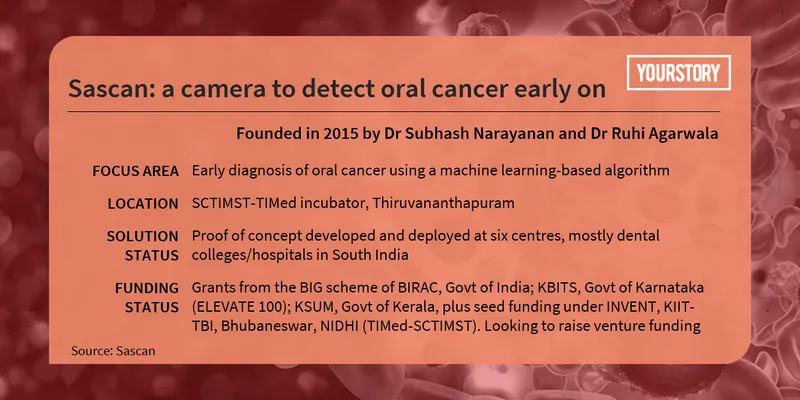
“Around 80,000 new cases of oral cancer are detected in the country each year. More than half the patients succumb to the disease because it is not detected at an early stage,” Dr Subhash Narayanan points out.
Sascan’s multispectral camera is a non-invasive and real-time solution to screen and detect cancer cells in the mouth. Its camera takes images of the inside of the mouth with illumination at different wavelengths of light. “The processed images are analysed in real time to decide whether the tissue is abnormal or not,” explains Dr Narayanan.
It then uses a machine learning-driven algorithm to analyse abnormalities to predict the grade of cancer. The device also guides the technician to that part of the tissue that is best suited for a biopsy. This minimises under-diagnosis and ensures the cancer is detected early on, thus improving the prognosis, says Dr Narayanan.
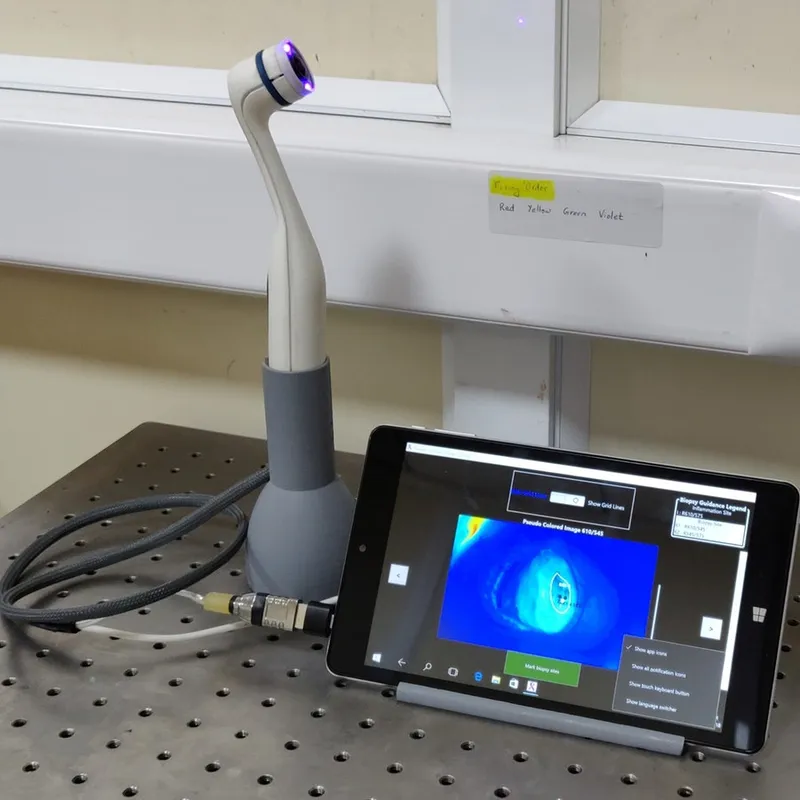
Sascan's handheld device to diagnose oral cancer.
The device, which is handheld, portable, and battery-powered, can also be used as a screening tool at primary health centres or by non-profit organisations running screening camps.
“It can be operated in villages too, and even when there is no electricity,” Dr Narayanan says, pointing out that the solution can be easily deployed in rural areas where the incidence of oral cancer is high.
Sascan is carrying out multicentric clinical trials to gather the large data set they need make their algorithm more robust. The technology can also be adapted to screen for other types of cancer too.
Exocan: diagnosing cancer using blood, urine, saliva
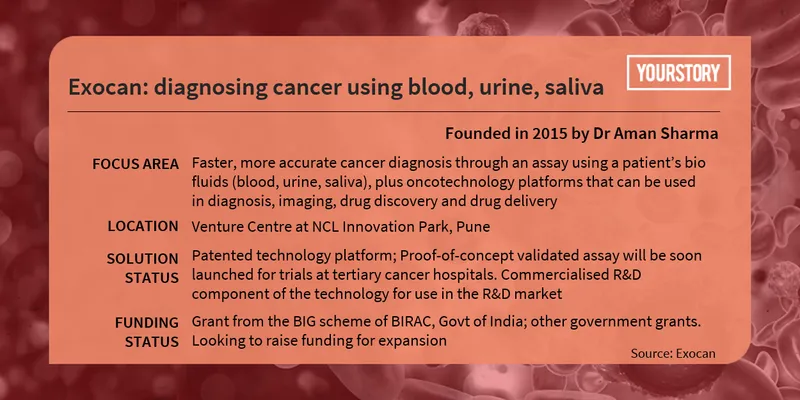
One of the biggest challenges in diagnosing cancer is that test results are not always conclusive. This, says Dr Aman Sharma, leads to the need for second and third opinions and more tests before an accurate diagnosis is made and treatment begins. For aggressive cancers, a two-week delay in treatment can prove costly for the patient in more ways than one.
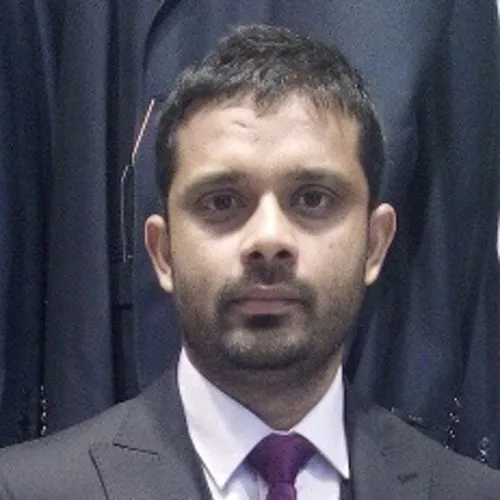
Dr Aman Sharma of Exocan
Aman set out to address this challenge by using exosomes, which can be used for molecular diagnosis of cancer without biopsy or scanning. Exocan’s technology-based assay analyses a patient’s biofluids (blood, saliva or urine) to provide precision diagnosis. The results – more accurate and less expensive than conventional methods – are available within just two days. The diagnostic assay, currently in development, is set to be tested in large trials soon. Aman expects its performance to top conventional testing (currently the gold standard) in terms of sensitivity and speed. Exocan can currently collect and process 500 patient samples a day.
The use of exosomes for diagnosing cancer is part of the niche but growing field of non-invasive liquid biopsy. There are less than five players globally but the technology received a thumbs up last year when one player, Exosome Diagnostics, was acquired for $250 million in cash by Bio-Techne Corporation.
Exocan relies on government grants and its own revenue from selling part of its technology to R&D customers. It is currently seeking scale-up capital for further validation, and to launch the assay on a large scale.
“We need to create more awareness among clinicians, investors, and public about emerging deep-biotech driven technologies in cancer management. Without that, we will just be using outdated science for cancer diagnosis,” rues Aman.
Exocan’s assay does not require a large manufacturing facility. It can be easily deployed in small labs in remote areas too as it does not need complex instrumentation or a highly-skilled medical professional, and thus makes cancer diagnosis easily accessible and affordable.
Also read: [Startup Bharat] With these startups, healthcare services are getting better in non-metros
Theranosis Life Sciences
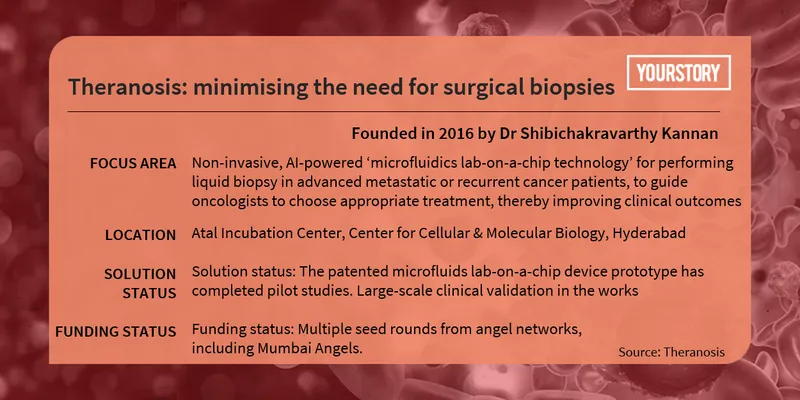
Theranosis is working on a type of liquid biopsy that detects live cancer cells in blood circulation. Their innovative “microfluidics lab-on-a-chip” technology captures circulating tumor cells (CTCs) in peripheral blood. “The CTCs are live cancer cells that metastasize to other organs via the bloodstream and grow into secondary cancers. So, CTCs are more important than DNA which are derived from dead cancer cells,” Dr Kannan explains.
The innovation lies in the design of the chip, which mimics real capillary blood flow. “Any abnormal cell can be easily distinguished from normal blood cells and analysed. The data captured using a high-speed microscope camera is then analysed using AI-powered algorithms.” says Dr. Kannan.
Theranosis promoting personalised medicine by evaluating the unique genotype of each patient (pharmacogenomics). “We are pioneering precision medicine in oncology in India by detecting the molecular subtypes of the primary tumour and circulating tumour cells together to address the tumour heterogeneity problem,” he explains.
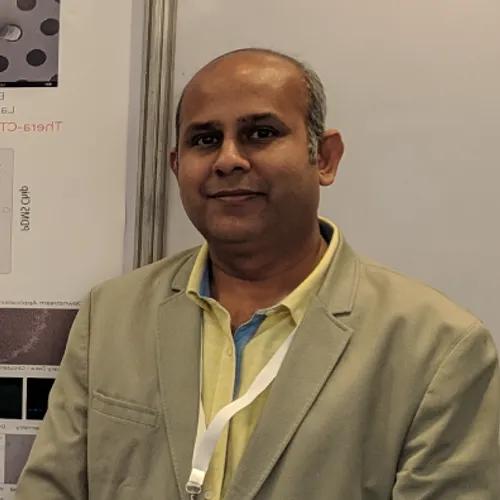
Dr Shibichakrabarthy Kannan of Theranosis
This lets doctors identify patients eligible for targeted therapies and immunotherapies, a new mode of cancer treatment, drugs for which were recently approved by the US FDA and are also available in India.
Theranosis has completed in-house pilot studies with its working prototype and is planning large-scale clinical validation. The next step is to deploy the solution at all major cancer hospitals in a year’s time.
The platform will be available on lease or reagent rental contract. Dr. Kannan estimates that a test for personalised treatment would cost patients Rs 7,500 ($99 target price). With the right support, the test can be made free of cost to patients at government hospitals.
Onward Health: machine learning tool to identify malignant tumours
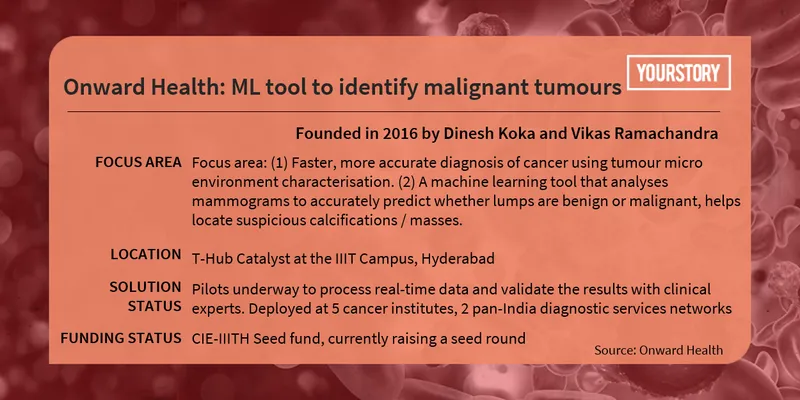
According a report by the NITI Aayog, India has only 500 pathologists specialising in cancer diagnosis. While there are many cancer screening programmes, we are short on the number of experts available to interpret the scans and tests.
Against this background, Onward Health has built a computer vision-based tool that helps pathologists diagnose more cases every day by providing deeper, more accurate insights from available samples. With Onward Assist's assistance in tumour micro environment characterisation, pathologists get deeper information, which allows for a more accurate prognosis and treatment decisions.
Onward is also building a histopathology tool that helps labs process twice the number of samples with the same resources. “One of the tools we are building for a specific set of biomarkers will provide deeper insights and quantified clinical information that will help the oncologist narrow down their choice of treatment decisions which can go a long way in improving patient outcomes,” Dinesh explains.
Additionally, their machine-learning tool for radiology scans mammograms and helps locate suspicious calcifications and masses. It also predicts whether these are benign or malignant at an early stage.
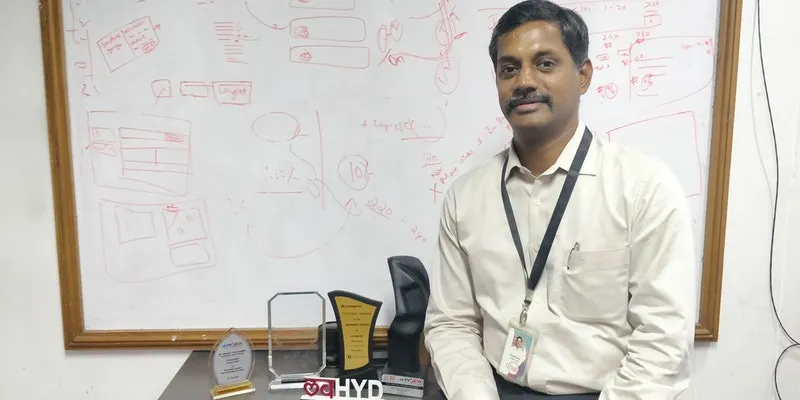
Dinesh Koka of Onward Health
Onward Assist can be licensed and easily used in rural and semi-urban locations too, thus improving access to expertise that is often limited to the big cities. The company is working with leading cancer institutes in India to refine their predictive analytics tools that will add value to the clinical decision-making workflow.
“Through these clinical collaborations, we get access to clinical expertise as well as data which helps us validate our models and further develop additional predictors,” adds Dinesh.
Niramai: non-invasive and faster diagnosis of breast cancer
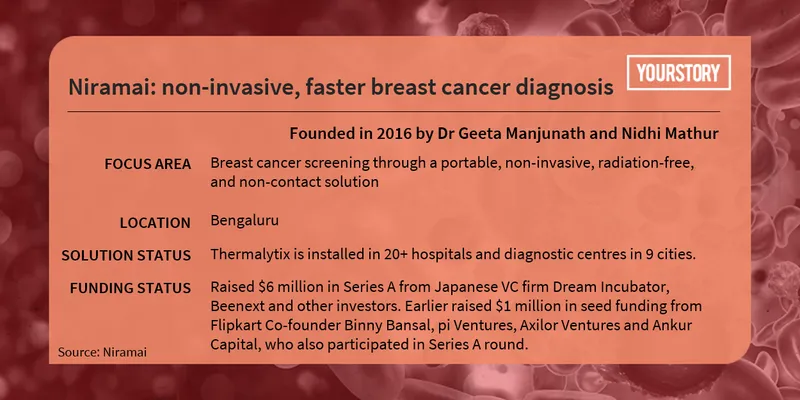
Mammograms are effective to detect breast cancer in women over the age of 40, but with the disease increasingly affecting younger women too, a new approach to early-stage diagnosis was the need of the hour.
Breast cancer is one of the most manageable forms of the disease, and the survival rate with early-detection is almost 99 percent, says Nidhi. And yet, the mortality rate in India is a steep 50 percent – mainly because it is not diagnosed in time. This is partly because many women are hesitant to get a breast examination done and tend to put it off for as long as they can.
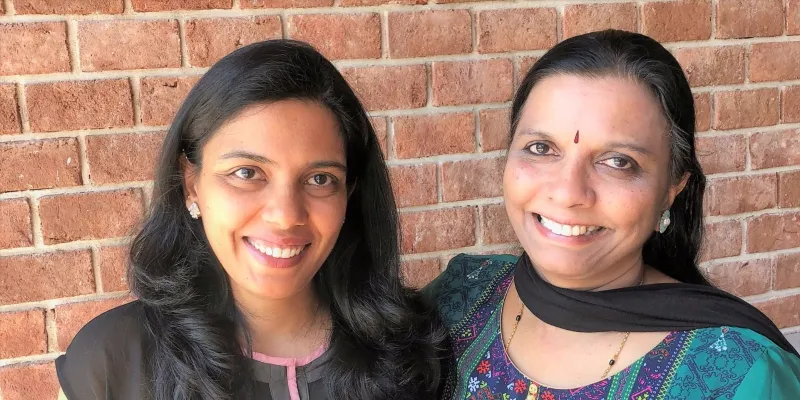
The founders of Niramai
Niramai’s AI-driven solution, Thermalytix, uses a high-resolution thermal sensing device that scans the chest area like a camera. This is done remotely, which means that it affords women privacy. It is also contact-less, so there is no touch involved. The thermal scan is then read by Thermalytix to detect any early signs of cancer.
What’s more, it can detect tumours five times smaller than what regular clinical examinations can. It is also far more affordable than conventional methods and does not require heavy equipment, making it ideal for use in smaller cities and towns.
Incidentally, the startup is the only Indian company listed on 2019 cohort of AI 100 startups in the world by global business data intelligence platform CB Insights.
Also read: AI healthcare startup Niramai raises $6M Series A funding led by Dream Incubator







